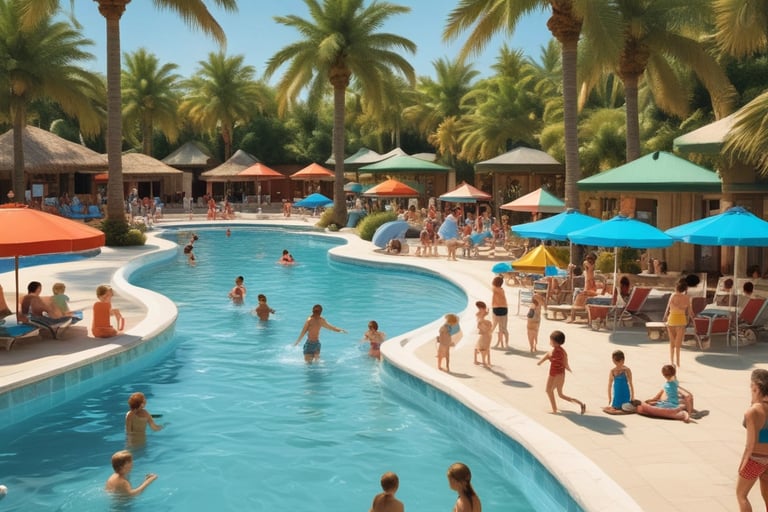The Best Accommodations for Neurodiverse Families: What to Look For
Blog post descriptionDiscover the best accommodations for neurodiverse families and what features to look for to support your child’s needs and ensure a stress-free vacation..
TIPS AND STRATERGIES


Family travel can be fun, an education, and togetherness. When it comes to families with neurodiverse children, however, traveling is a case that needs careful planning and special attention. These can be sensory sensitivities, unknown environments, unpredictability, and these can make or break the trip.
This is one of the reasons why it is important to find the right accommodations, not only to feel comfortable in them but also to make sure that everyone can enjoy the experience and not feel left out.
This guide is going to discuss what makes a vacation environment family-friendly regarding children who are neurodiverse, what to consider when making a reservation, and how to relax and structure the activity to make it more enjoyable.
Whether you are parenting a neurodiverse child for the first time or an old-time traveler who wants to acquire new knowledge, this is how you can plan something with both certainty and care.
Understanding Neurodiversity in a Travel Context
Neurodiversity is the term used to describe the diversity of individual differences in brain performance and behavioural characteristics within normal variation among people. Neurodiversity comes in numerous forms, although there are some common types of neurodiversity, which include autism, ADHD, and dyslexia sensory processing disorder.
Every neurodiverse child is individual, but the vast majority of children present neurodivergent symptoms, including feeling anxious in unfamiliar situations, being unable to tolerate deviations in the routine, or being extremely sensitive to sound, light, and crowds. Those symptoms may be especially extensive in foreign venues like airports, hotels, and theme parks.
Unlike typical children, who are usually quick to develop a travel routine, neurotypical children might require special assistance, including accommodation.
Features That Matter Most in Accommodations
Selecting where to stay with family requires more than the usual filters of price, place, and amenity. In the case of neurodiverse families, it is important to go deeper.
Sensory-Friendly Design
The prevention of sensory overload autism-related meltdowns mainly depends on a calm and well-organized environment. Try to find a place to stay that has:
Neutral lighting and décor
Rooms that are soundproofed or areas in the hotel that are less noisy
Options to control the room temperature and lighting
Some autism-friendly all-inclusive resorts take it one step further and have sensory rooms or so-called quiet zones where a child can self-regulate to recharge. These characteristics are able to relieve pressure on the whole family.
Visual Schedules and Routine Support
Structured routines and visual timetables are helpful to children who need to depend on consistency. Various properties have printed or app-based visual schedules of the daily routine, meal times, and features.
The ones that meet these needs are hotels that provide checklists or calendars as a program. These accommodations for neurodivergent students help those who need consistency not only in family vacations but also in educational ones.
Staff Trained in Autism Awareness
It makes a significant impact to book a place with neurodiversity-trained staff. Working with knowledgeable staff who know how to react to a meltdown or how to access special services will make for a safe and inclusive place.
Some autism-friendly vacations involve properties teaming up with experts to design activities about sensory, communication, and behavior experiences. Usually, these consist of tasks in which employees can interact with neurodiverse children in a meaningful, therapeutic manner.
Destinations That Go the Extra Mile
Resorts for autism vacations exist around the world. Such destinations frequently focus whole travel experiences on the requirements of a neurodiverse family.
For example, at resorts in Florida and Pennsylvania, there are sensory-friendly rooms, all-inclusive kids programs, and even on-site therapists.
Autism-friendly holidays in Europe are becoming more common, with the most popular destinations being the UK, Italy, and Spain. Such resorts usually offer structured programs, sensory kits, and autism-friendly modes of transport.
Accommodations in both options will provide neurodiverse children with specific services and make sure siblings and parents feel like they have the chance to spend a normal family vacation.
Site Activities That Engage and Support
The rooms should not be the only neurodiverse-friendly room, but the activities as well. Shops, hotels, and resorts that present experiences crafted around sensory interaction can offer secure outlets of energy and creativity.
Ask for a sensorial activities list when you book. This could consist of:
Sand and water play areas
Nature walks and tactile gardens
Movement-friendly activities like yoga or trampoline parks
Art and music therapy stations
All these activities give the children an opportunity to explore at their own leisure as they learn valuable sensory and motor skills. They are also a nice means of closing the divide in the interests of the neurodiverse and neurotypical siblings when it comes to family play.
Don’t Forget Parent Self-Care
Parents tend to concentrate all their efforts on satisfying the needs of the child and forget about themselves much too often. However, the importance of self-care for parents is vital, and while traveling, it is essential. A rested, supported parent is more equipped to handle challenges and enjoy the trip.
Choose accommodations that encourage family self-care, such as spa access, meditation rooms, or supervised kids’ activities. There are some autism-friendly vacations that offer parent workshops or even quiet spots where caregivers can relax and be rejuvenated.
Self-care for Parents is not a luxury, but it is a necessity. Resting or getting some time off benefits us all to have better, more balanced experiences.
Choosing the Right Accommodation
These are a couple of tips to help you easily and efficiently plan:
Call ahead to ask if they have sensory-friendly setups and staff who understand neurodiverse needs. To ensure that the accommodation has sensory-friendly setups.
Request early check-in and/or late check-out so not to get caught during transitions.
Read reviews of other families with a neurodiverse child to have an idea.
Seek flexibility when reserving and cancelling in case your child’s health and mood change.
The effort to research pays off. When the environment is favourable, chances are that your child will be relaxed, and this benefits the entire family too.
Final Thoughts: Every Family Deserves a Great Vacation
It can be a useful strategy to find suitable accommodation to make your trip more accommodating in terms of meeting the needs of your child, instead of considering them as a supplementary detail. Fortunately, inclusive mindful travel is being adopted by more destinations.
Staying at autism friendly all inclusive resorts, or taking an autism friendly holidays Europe, not only decreases the stress of traveling, but also shows your child that they are welcome.
As soon as you make joy and connection your priority, both to your child and to yourself, you create a memory that you will carry with you, and an assurance that you and your child will have the confidence to continue navigating the world together.









